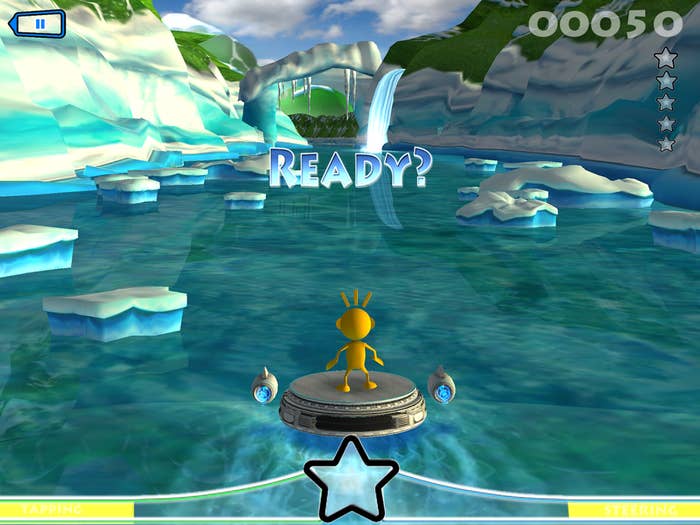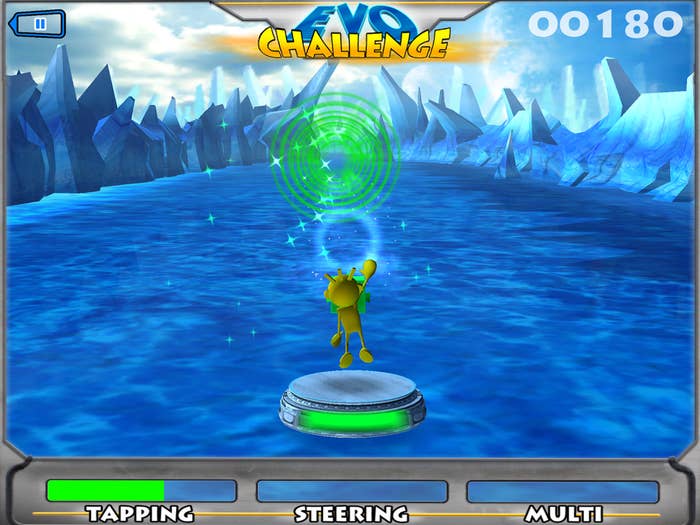
You're a bright-yellow alien cruising down a river with icebergs at every sharp turn. Your goal: to leap up and grab the hovering objects of certain colors while ignoring the others. The more objects you grab, the faster they appear before you.
It's a fun, slick-looking video game called Project: EVO — but it's also a new form of cognitive disorder therapy based on years of research. The Boston company behind the program, Akili Interactive Labs, is putting it through clinical trials with the intent of winning federal approval to sell it as as a medical product.
Akili plans to test Project: EVO in children with a dual diagnosis of autism and attention deficit hyperactivity disorder. It will be years before clinical trials prove whether the game actually works. If it does, it may prove to be an anomaly in the cognitive training software market, a billion-dollar industry some scientists fear is built on exaggerated health claims.
"The science is pretty strong," Benjamin Yerys, an assistant professor of psychology at the University of Pennsylvania and the Center for Autism Research at The Children's Hospital of Philadelphia, told BuzzFeed News. "In fact, I would say this is probably a new gold standard in terms of what they've been able to accomplish relative to a lot of other previous treatment studies that have tried to use video games or game training or 'edutainment.'"

Akili's newest study, which is sponsored by the autism advocacy organization Autism Speaks, is for patients diagnosed with both autism and ADHD, a condition that didn't exist until recently — at least not officially. Under mental health guidelines established in 1994, doctors were required to pick one diagnosis or the other, partly because of worries that inattentiveness related to autism might be mistaken for ADHD and autistic children wouldn't receive the treatments they need. In 2013, those rules changed to reflect growing evidence that the two disorders can indeed overlap in genetic risk factors and symptoms. One study suggests that one-third of autistic children also have ADHD, although estimates vary.
Such children might benefit from non-medicinal therapies like Project: EVO, because ADHD medications sometimes cause negative side effects, like irritability and aggression, in autistic children who do not also have ADHD, said Dr. Ernest Pedapati, an assistant professor who specializes in treating neuropsychiatric diseases at Cincinnati Children's Hospital Medical Center.
Pedapati, who is not involved with Akili, said new treatments like Project: EVO are important, but must be validated. He cautioned that there is little evidence to suggest such cognitive disorder therapies improve memory skills long-term or bolster other skills like verbal ability or arithmetic. Indeed, a 2013 scientific review of 23 memory training program studies bears this out.
"You can play Super Mario and get better in a couple weeks," Pedapati told BuzzFeed News. "The question is, does that carry over to the real world? There's no doubt that whatever the game is, they're going to get better at it. But what does that mean in outside everyday life?"
A video game developed and studied by Dr. Adam Gazzaley, a neuroscientist at the University of California, San Francisco, and co-founder of and chief science adviser to Akili, could mean lasting cognitive improvements in older adults. Gazzaley's landmark 2013 study on this topic made the cover of the prestigious medical journal Nature.
Gazzaley's team tested a prototype of Project: EVO, then called NeuroRacer, in older adults. Players drove a car along a winding road, and as objects popped into view, they shot down the ones of certain shapes and colors. To keep up, players had to multitask — a cognitive skill that deteriorates with age.
Playing the game appeared to increase activity in the brain's prefrontal cortex, which analyzes thoughts and regulates behavior, as well as a neural network that links the prefrontal cortex with the back of the brain. What's more, tests taken after training showed that cognitive abilities the game didn't specifically target, like sustained attention and working memory, also improved.
In the new study for autism and ADHD, which will begin later this year, the game would ideally help preteens and teens improve their ability to process information before they transition out of high school, said Eddie Martucci, chief operating officer at Akili.
In addition, Akili has partnered with two pharmaceutical giants — Pfizer and Shire — to determine whether Project: EVO can detect Alzheimer's disease and treat children with ADHD only. Other studies are underway for depression.
It remains to be seen whether the game will help improve autism and ADHD equally, said Suzy Scherf, an assistant professor of psychology and neuroscience at Pennsylvania State University, who is not involved with Akili.
"The muiltitasking deficits that this particular game is specifically designed to address [are] not necessarily a core feature of autism," she said. "To the extent that ADHD is an additional problem in kids with autism, this is going to help them, presumably. But to the extent that it is going to treat autism-related symptoms is really an open question."
Still, the game is promising, said Dan Smith, president of Autism Speaks' venture philanthropy arm, which is giving a half-million dollars to fund the clinical trial with Akili.
"What Akili is doing represents a pretty unique kind of therapeutic intervention," he said. "There was a real evidence basis for what they were trying to do, based in good science. There's not a neurogaming product with evidence behind it for almost any population right now, and definitely not for people with autism."
